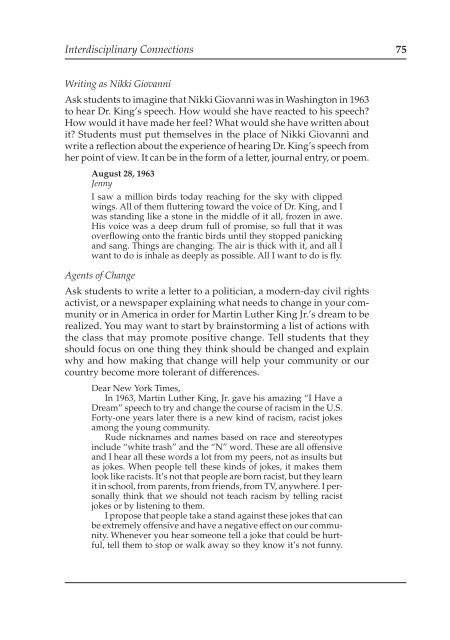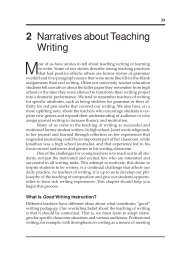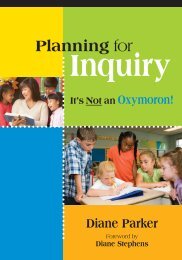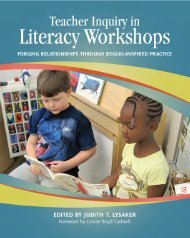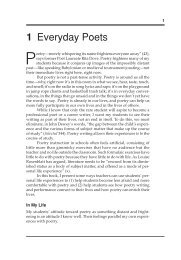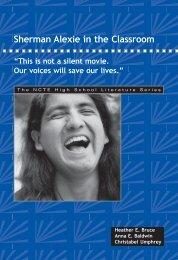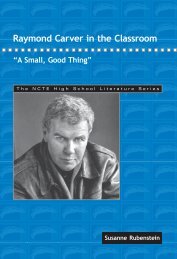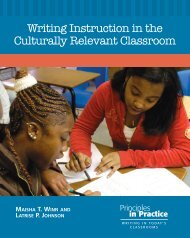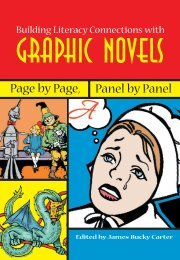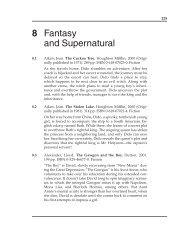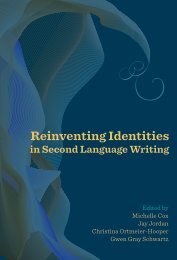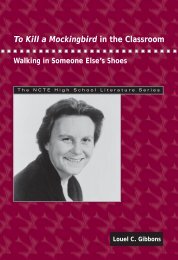Wood_cover.qxd (Page 1) - National Council of Teachers of English
Wood_cover.qxd (Page 1) - National Council of Teachers of English
Wood_cover.qxd (Page 1) - National Council of Teachers of English
- No tags were found...
You also want an ePaper? Increase the reach of your titles
YUMPU automatically turns print PDFs into web optimized ePapers that Google loves.
Interdisciplinary Connections 75Writing as Nikki GiovanniAsk students to imagine that Nikki Giovanni was in Washington in 1963to hear Dr. King’s speech. How would she have reacted to his speech?How would it have made her feel? What would she have written aboutit? Students must put themselves in the place <strong>of</strong> Nikki Giovanni andwrite a reflection about the experience <strong>of</strong> hearing Dr. King’s speech fromher point <strong>of</strong> view. It can be in the form <strong>of</strong> a letter, journal entry, or poem.August 28, 1963JennyI saw a million birds today reaching for the sky with clippedwings. All <strong>of</strong> them fluttering toward the voice <strong>of</strong> Dr. King, and Iwas standing like a stone in the middle <strong>of</strong> it all, frozen in awe.His voice was a deep drum full <strong>of</strong> promise, so full that it wasoverflowing onto the frantic birds until they stopped panickingand sang. Things are changing. The air is thick with it, and all Iwant to do is inhale as deeply as possible. All I want to do is fly.Agents <strong>of</strong> ChangeAsk students to write a letter to a politician, a modern-day civil rightsactivist, or a newspaper explaining what needs to change in your communityor in America in order for Martin Luther King Jr.’s dream to berealized. You may want to start by brainstorming a list <strong>of</strong> actions withthe class that may promote positive change. Tell students that theyshould focus on one thing they think should be changed and explainwhy and how making that change will help your community or ourcountry become more tolerant <strong>of</strong> differences.Dear New York Times,In 1963, Martin Luther King, Jr. gave his amazing “I Have aDream” speech to try and change the course <strong>of</strong> racism in the U.S.Forty-one years later there is a new kind <strong>of</strong> racism, racist jokesamong the young community.Rude nicknames and names based on race and stereotypesinclude “white trash” and the “N” word. These are all <strong>of</strong>fensiveand I hear all these words a lot from my peers, not as insults butas jokes. When people tell these kinds <strong>of</strong> jokes, it makes themlook like racists. It’s not that people are born racist, but they learnit in school, from parents, from friends, from TV, anywhere. I personallythink that we should not teach racism by telling racistjokes or by listening to them.I propose that people take a stand against these jokes that canbe extremely <strong>of</strong>fensive and have a negative effect on our community.Whenever you hear someone tell a joke that could be hurtful,tell them to stop or walk away so they know it’s not funny.


